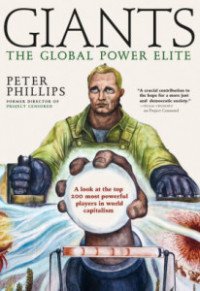
Project Censored
On this week's show, we present a recent talk, "Giants - The Global Power Elite," given by Peter Phillips at Sonoma State University this past March.
Extending the ideas of C. Wright Mills to the 21st century, Peter Phillips contends that a few hundred corporate managers and billionaires now control the majority of the world's wealth, and thus are today's ruling "transnational corporate class" ('TCC'). He identifies these corporations and individuals in a forthcoming; the speech is a summary of the ideas in the book.
Peter Phillips is Professor of Sociology at Sonoma State University, and a former director of Project Censored.
A look at the top 200 most powerful players in world capitalism, who are at the controls of our economic future.
Who holds the purse strings to the majority of the world's wealth? There is a new global elite at the controls of our economic future, and here former Project Censored director and media monitoring sociologist Peter Phillips unveils for the general reader just who these players are. The book includes such power players as Mark Zuckerberg, Bill Gates, Jeff Bezos, Jamie Dimon, and Warren Buffett.
As the number of men with as much wealth as half the world fell from sixty-two to just eight between January 2016 and January 2017, according to Oxfam International, fewer than 200 super-connected asset managers at only 17 asset management firms—each with well over a trillion dollars in assets under management—now represent the financial core of the world's transnational capitalist class. Members of the global power elite are the management—the facilitors—of world capitalism, the firewall protecting the capital investment, growth, and debt collection that keeps the status quo from changing. Each chapter in Giants identifies by name the members of this international club of multi-millionaires, their 17 global financial companies—and including ngos such as the Group of Thirty and the Trilateral Commission—and their transnational military protectors, so the reader, for the first time anywhere, can identify who consitutes this network of influence, where the wealth is concentrated, how it suppresses social movements, and how it can be redistributed for maximum systemic change.
- KBOO


